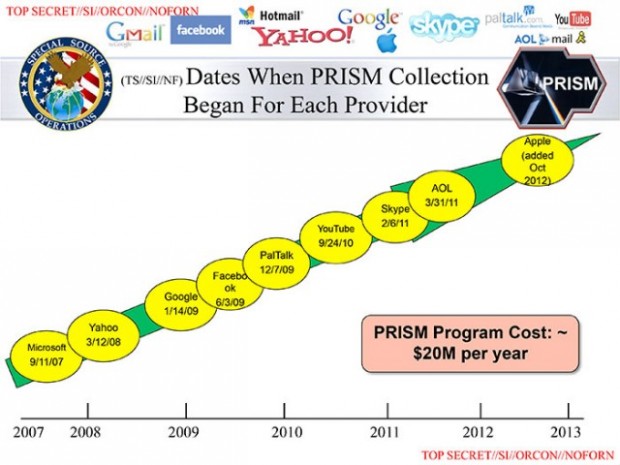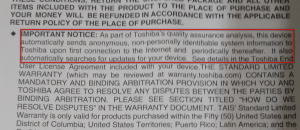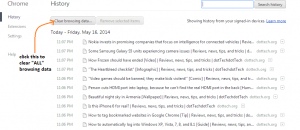This is a little late, but in light of recent events it’s still certainly worth covering. Just days after the news broke that the NSA or National Security Agency had a secret court order which allowed them to view various wireless records, we found out it was a lot worse than first revealed. Both The Guardian and The Washington Post published information about a secret surveillance program called PRISM.
The program provided government agencies with the ability to collect data “directly from the servers” of companies like Microsoft, Google, Apple, Facebook and Yahoo. According to the leaked materials, Dropbox support is “coming soon”.
Basically, the system allows the NSA and the FBI to “extract[…] audio, video, photographs, e-mails, documents, and connection logs that enable analysts to track a person’s movements and contacts over time.”
Interestingly enough, even after the news broke, technology companies like Facebook, Apple and Google have all gone on the record denying acknowledgement of PRISM. In fact, in a recent statement Google even said, “Google cares deeply about the security of our users’ data. We disclose user data to government in accordance with the law, and we review all such requests carefully.”
A spokesperson for Dropbox told Ars Technica the following:
“We’ve seen reports that Dropbox might be asked to participate in a government program called PRISM. We are not part of any such program and remain committed to protecting our users’ privacy.”
Other tech companies also responded to Ars Technica’s queries with the following statements:
Facebook- “Protecting the privacy of our users and their data is a top priority for Facebook. We do not provide any government organization with direct access to Facebook servers. When Facebook is asked for data or information about specific individuals, we carefully scrutinize any such request for compliance with all applicable laws, and provide information only to the extent required by law.”
Microsoft- “We provide customer data only when we receive a legally binding order or subpoena to do so, and never on a voluntary basis. In addition we only ever comply with orders for requests about specific accounts or identifiers. If the government has a broader voluntary national security program to gather customer data we don’t participate in it.”
Aol- “We do not have any knowledge of the Prism program. We do not disclose user information to government agencies without a court order, subpoena or formal legal process, nor do we provide any government agency with access to our servers.”
James Clapper, the Director of National Intelligence later released the following statement in response to recent press coverage of the entire situation:
“The Guardian and Washington Post articles refer to collection of communications pursuant to Section 702 of the Foreign Intelligence Surveillance Act. This law does not allow the targeting of any U.S. citizen or of any person located within the United States,” the statement said. “The program is subject to oversight by the Foreign Intelligence Surveillance Court, the Executive Branch, and Congress. It involves extensive procedures, specifically approved by the court, to ensure that only non-U.S. persons outside the U.S. are targeted, and that minimize the acquisition, retention and dissemination of incidentally acquired information about U.S. persons.”
Of course, by now you’ve heard that the whistleblower behind the entire reveal was Edward Joseph Snowden. After bringing the secret operations to light, Snowden fled to Hong Kong to remain safe and secure from would-be attackers and persecution.
“Perhaps I am naive, but I believe that at this point in history, the greatest danger to our freedom and way of life comes from the reasonable fear of omniscient state powers kept in check by nothing more than policy documents.”
Many are conflicted about Snowden’s actions, and the fact that the government is now working to prosecute him for his actions. On one hand, as mentioned by House speaker John A. Boehner “he’s a traitor.”
“The disclosure of this information puts Americans at risk. It shows our adversaries what our capabilities are. And it’s a giant violation of the law.”
On the other hand, Snowden did bring to light several government programs that definitely appear to be operating outside the law.
What’s your stance on the entire situation? What would you like to see happen to Snowden? Let us know in the comments below!
[via Ars Technica, Information Week]

 Email article
Email article




